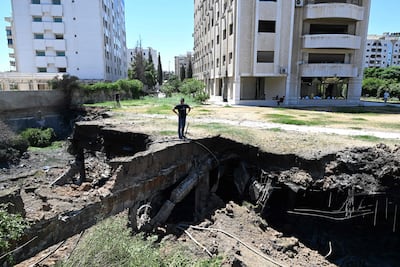Live updates: Follow the latest news on Israel-Gaza
Two months before Syrian business tycoon Mohammad Baraa Katerji was assassinated on Monday, his conglomerate announced that it would build a huge industrial complex in Aleppo.
The project would be finished within a year and provide jobs for thousands, the company said.
There were rumours at that time that a feud had emerged between the ruling elite in Damascus and Mr Katerji, one of a group of pro-government businessmen who had built fortunes in Syria's war economy but were seen as becoming too powerful.
After Russia's military intervention in 2015, four years into the civil war, ensured the survival of President Bashar Al Assad, he began consolidating his power along with his inner circle consisting of his wife, Asma, and his brother Maher.
As part of the consolidation, they engaged in a campaign to reign in the businessmen they had supported. Some were stripped of their wealth, like Mr Al Assad's maternal cousin Rami Makhlouf, while others died in mysterious circumstances.
Both Mr Katerji's company as well as pro-government Syrian media outlets blamed Israel for the strike on his vehicle near the Lebanese border. The attack was not acknowledged by Israel, which rarely comments publicly on such strikes, nor was there any independent confirmation that it was involved.
Mr Katerji, born in 1976, was not known in business circles before the Syrian civil war. His Aleppo-based Katerji Holding conglomerate, which has close links with Iran, focused on oil and gas, construction, manufacturing, transport, trading and finance.
According to a member of the Syrian opposition who monitors the regime's business connections, Mr Katerji's road transport fleet, consisting of oil tankers and lorries, has been an important part of the weapons supply chain from Iran to the Lebanese militia Hezbollah, with cargo pickup points located near Syria's border with Iraq.
“The Israelis have been watching Katerji for a long time, and after the Gaza war, they had to act,” the opposition member told The National.
He said the killing of Mr Katerji indicated that “Israel is expanding the circle of its targets in Syria” to include members of the business class linked to Iran.
“They are no longer safe,” he said.
Israel has increased its campaign of assassinating Iranian-linked figures in Syria and Lebanon since the war in Gaza broke out in October.
Last week, another Israeli drone strike killed Yasser Kranbish, a former bodyguard of Hezbollah leader Hassan Nasrallah, on the same road on which Mr Katerji died.
Sources in the Syrian opposition said Mr Kranbish was a central operative in Hezbollah's operations to secure advanced weaponry.

Benjamin Feve, an analyst at the Beirut-based research organisation Triangle, said that as well as handling arms transfers for Iran's militia allies, Mr Katerji was suspected of facilitating financial transactions involving Tehran.
His killing by Israel, if confirmed, indicated that Israel could “now target anyone, not just military figures” and that “no one is safe, not even businessmen”.
“It appears that no other regime figures with similar profiles have been killed by Israel,” Mr Feve said.
“We will see in the coming weeks how this might initiate new ‘trends’ in targeted assassinations.”
Mr Katerji had built his empire on supplying oil, which became a scare commodity in government-controlled areas during the course of the war, with ISIS, and later Kurdish militias, capturing the country's main oilfields, although Syria's two refineries remained in regime hands.
His allegiance to Mr Al Assad did not prevent him from opening channels with the president's opponents, as long as these links were lucrative.
When imposing sanctions on Mr Katerji and his brother Husam, a member of parliament, in 2018, the US government said the businessman had “facilitated fuel trade between the Syrian regime and ISIS, including providing oil products to ISIS-controlled territory”.
Mr Katerji was also the pointman in multibillion dollar oil trade between the regime and Kurdish-controlled areas, Kurdish sources and diplomats who follow Syrian politics said.
The promotional video for his company's new industrial estate project opened with an image of Mr Al Assad, to project a solid link with the president. It said the complex would be the largest such private venture in the Middle East, and that work on it would be round the clock.
A businessman from Aleppo said Mr Katerji had good ties with Mr Al Assad and his wife, who had sharply raised their influence in the economy and business over the past five years, as well as with Maher Al Assad, whose elite Fourth Division guards the frontier between government-controlled areas and the Kurdish militia-run zone.
“Internally, Katerji made sure to be on good terms with every one,” he said. “He was a very smart businessman. But his connection to Iran was too much.”
